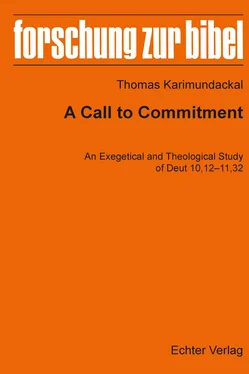Forschung zur Bibel Band 135
Begründet von
Rudolf Schnackenburg
und Josef Schreiner
Herausgegeben von
Georg Fischer
und Thomas Söding

Thomas Karimundackal
A Call to Commitment
An Exegetical and Theological Study
of Deut 10, 12–11, 32
Echter Verlag
Bibliografische Information der Deutschen Nationalbibliothek
Die Deutsche Nationalbibliothek verzeichnet diese Publikation in der Deutschen Nationalbibliografie; detaillierte bibliografische Daten sind im Internet über < http://dnb.d-nb.de> abrufbar.
© 2017 Echter Verlag GmbH, Würzburg
www.echter.de
eBook-Herstellung und Auslieferung:
Brockhaus Commission, Kornwestheim
www.brocom.de
ISBN 978-3-429-04400-8
978-3-429-04940-9 (PDF)
978-3-429-06360-3 (ePub)
PREFACE
The following study is a revised and abbreviated version of my doctoral thesis submitted to the University of Innsbruck in October 2016. Its main purpose is to explore the exegetical and theological significance of the final parenesis of Deuteronomy (10,12-11,32) in the composition of Deuteronomy. I am grateful to the editors of the series Forschung zur Bibel , Prof. Dr. Georg Fischer and Prof. Dr. Thomas Söding, for accepting this work for publication.
The completion of this study is the culmination of four years of intense academic formation during which time God has helped me through many individuals in order to make this study possible. First among them is Univ.– Prof. Dr. Georg Fischer, SJ, who directed this study with much wisdom and insight, and I will be forever grateful for the chance to train for lifelong scholarship and teaching under his care and direction. His scholarly contribution, with deep exegetical insights and subtle observations, has provided an unfailing source of inspiration. To study under him was a privilege and I owe a lot to him for his guidance during this study.
I am particularly indebted to Dr. Dominik Markl, SJ, Professor of the Old Testament at the Pontifical Biblical Institute, Rome, who consented to be the second supervisor of this study. I have enjoyed the extended discussions with him, and he has helped to sharpen my thinking and contributed to overcoming various hurdles in this study. I am grateful for his encouragement, assistance and readiness to oblige.
My sincere thanks are due to Prof. Dr. Robert Althann, SJ, Prof. Dr. Kurien Kunnumpuram, SJ, Dr. Barbara Hagemeister and Dr. Saji Kizhakkayil, who read the draft attentively and made valuable suggestions for improvement.
The Jesuit community in Innsbruck helped me with their generous hospitallity, fraternal love and scholarly atmosphere to bring this work to completion. I remember gratefully the Late Fr. Severin Leitner, SJ, (R.I.P) who invited me to pursue doctoral studies in Innsbruck and welcomed me to the community at the Jesuitenkolleg. I should also like to express my sincere gratitude for the generous encouragement given to me by Rev. Fr. Markus Inama, SJ, the Rector and my fellow Jesuits in Jesuitenkolleg, Innsbruck.
Many more are my Jesuit brethren to whom I am deeply indebted: the Provincial of the South Asian Assistancy and his team, the Provincial and members of the Kerala province, my colleagues in Jnana-Deepa Vidyapeeth, Pune. They sustained me throughout my study with constant encouragement, companionship and fraternal love. This is also an opportunity for me to acknowledge the support and affection of Rev. Dr. Hansruedi Kleiber, S.J., during my stay in Luzern, and the financial assistance that he rendered for the publication of this study.
I am also grateful and deeply indebted to my family and friends who strengthened me with their love, support and prayers during these years of academic work and personal growth. I wish to dedicate this work to my beloved intercessors in heaven, my dearly beloved mother Mariyakutty, my brothers Joy, Abraham, Augustine and my little sister Princy. To their “ever living memory”, I owe a debt of gratitude.
Now, to the One Who is worthy of all praise, may he be exalted through this study: “He is your praise and He is your God, who has done for you these great and awesome things which your eyes have seen” (הוא תהלתך והוא אלהיך אשׁר־עשׂה אתך את־הגדלת ואת־הנוראת האלה אשׁר ראו עיניך: Deut 10,21).
Thomas Karimundackal, SJ
Jnana-Deepa Vidyapeeth
Pontifical Athenaeum of Philosophy and Religion
Pune
May 2017
CONTENTS
PREFACE
INTRODUCTION
1. Choice of the subject
2. Why this pericope?
3. Goal of the study
4. Methodology and areas of the research
5. Itinerary of the study
CHAPTER 1
APPROACHING THE TEXT
1. The delimitation of the examined text
1.1 Deut 10,12 - the beginning of the fifth parenesis
1.2 Deut 11,32 - the end of the fifth parenesis
1.3 Internal coherence of the unit
2. The context of Deut 10,12-11,32
2.1 The preceding context
2.1.1 Israel’s self-righteousness and Yhwh’s grace
2.1.2 Israel’s faithlessness and Yhwh’s faithfulness
2.1.3 Resumption of Israel’s journey
2.1.4 Explicit connections between 9,1-10,11 and 10,12-11,32
2.2 The succeeding context
2.2.1 Explicit connections between 10,12-11,32 and 12,1-31
2.2.2 Distinguishing characteristics of Deut 12,1-13,1
2.2.3 Conclusion
3. Translation and text-critical notes on the text
3.1 Qumran Manuscripts
3.2 Translation and textual notes
3.3 Observations on the MT and the Smr
3.3.1 Harmonizing alterations
3.3.2 Alterations related to content and ideology
3.3.3 Linguistic corrections
3.3.4 Orthographical changes
3.3.5 Alterations by the omission of words
3.4 Observations on the MT and the LXX
3.4.1 Harmonizing alterations
3.4.2 Theological interpretation
3.4.3 Alterations by additions
3.4.4 Linguistic corrections
3.5 Observations on the MT and the Qumran texts
3.5.1 Orthographical changes
3.5.2 Harmonizing alterations
3.5.3 Resemblance to the LXX and the Smr
3.5.4 Alterations by addition/omission of words and linguistic correction
3.5.5 Variations among the Qumran manuscripts
3.6 Conclusion
CHAPTER 2
THE STRUCTURE AND DYNAMICS OF DEUT 10,12-11,32
1. The structure of Deut 10,12-11,32
1.1 Criteria for textual division
1.2 Structural division of Deut 10,12-11,32
1.2.1 Space
1.2.2 Time
1.2.3 Persons
1.2.4 Communication
1.2.5 Vocabulary
1.3 A closer look at the sub-sections
1.3.1 Deut 10,12-22: Israel’s need for a Yhwh-centred existence
1.3.2 Deut 11,1-7: Israel’s challenge for a Yhwh-centred existence
1.3.3 Deut 11,8-17: Israel’s prospect for a Yhwh-centred existence
1.3.4 Deut 11,18-25: Israel’s accountability for a Yhwh-centred existence
1.3.5 Deut 11,26-32: Israel’s choice for a Yhwh-centred existence
1.4 Proposed structural outline of Deut 10,12-11,32
2. The Dynamics of Deut 10,12-11,32
2.1 The beginning and the end
2.2 Temporal movement
2.3 Spatial movement
2.4 Character movement
2.4.1 God
2.4.2 Israel
2.5 Repetition and intensification
2.6 Thematic movement
2.7 Conclusion
CHAPTER 3
ANALYSIS AND INTERPRETATION OF THE TEXT
1. Deut 10,12-22: Israel’s need for a Yhwh-centred existence
1.1 Deut 10,12-13: Requirements for a Yhwh-centred existence
Читать дальше













